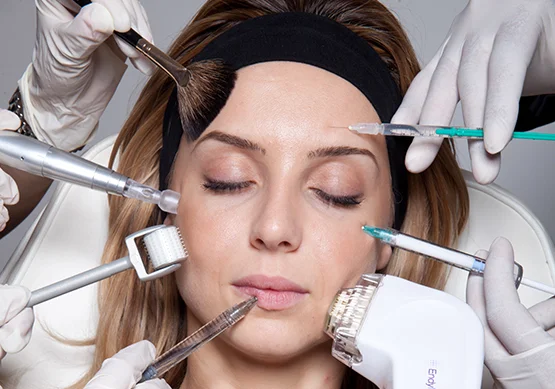Skin aesthetics is an ever-evolving field encompassing a wide range of treatments, products, and practices to enhance the appearance and health of the skin. From traditional skincare routines to advanced dermatological procedures, pursuing beautiful skin is a universal concern. This article will delve into the various aspects of skin aesthetics, offering insights into the latest trends, treatments, and tips for achieving and maintaining healthy, radiant skin.
Understanding Skin Aesthetics
What is Skin Aesthetics?
Skin aesthetics refers to the practice of improving the appearance of the skin through various methods. It includes skincare routines, cosmetic treatments, and medical procedures designed to enhance skin health, texture, and appearance. This field bridges the gap between beauty and dermatology, offering superficial and deep skin treatments.
Importance of Skin Aesthetics
Healthy, glowing skin is often seen as a sign of vitality and youth. Beyond aesthetics, good skin health is essential for overall well-being, as the skin is the body’s largest organ and its first line of defence against environmental stressors. Investing in skin aesthetics can improve self-esteem, confidence, and general health.
The Basics of Skincare
Skin Types and Their Needs
Understanding your skin type is crucial for choosing the right skincare products and treatments. The main skin types are:
- Normal Skin: Balanced, clear, and not prone to severe sensitivity.
- Oily Skin: Characterized by excess sebum production, leading to shine and potential acne.
- Dry Skin: Lacks moisture, leading to flakiness and a tight feeling.
- Combination Skin: Features oily and dry areas, usually with an oily T-zone.
- Sensitive Skin: Easily irritated and prone to redness and reactions.
Essential Skincare Routine
A basic skincare routine typically includes the following steps:
- Cleansing: Removing dirt, oil, and makeup keeps the skin clean and prevents clogged pores.
- Exfoliating: Removing dead skin cells to reveal smoother, brighter skin.
- Toning: Balancing the skin’s pH and removing any residual impurities.
- Moisturizing: Hydrating the skin to maintain its barrier function and softness.
- Sun Protection: Apply sunscreen to protect against harmful UV rays and prevent premature ageing.
Advanced Skin Treatments
Chemical Peels
Chemical peels involve applying a solution to the skin that exfoliates and eventually peels off, revealing new, regenerated skin. They can treat various skin issues, including acne scars, wrinkles, and hyperpigmentation.
Types of Chemical Peels
- Superficial Peels: Mild acids like alpha-hydroxy acids (AHAs) for gentle exfoliation.
- Medium Peels: Trichloroacetic acid (TCA) for more significant skin resurfacing.
- Deep Peels: Stronger acids like phenol for deep skin rejuvenation, usually with longer recovery times.
Microdermabrasion and Dermabrasion
These mechanical exfoliation techniques remove the outermost layer of skin to improve texture and appearance.
Microdermabrasion
A minimally invasive procedure using a unique applicator with an abrasive surface to gently sand away the thick outer layer of the skin. It’s used for light scarring, discolouration, and sun damage.
Dermabrasion
A more intensive treatment that involves a rotating instrument to remove deeper layers of skin is often used for acne scars, deep wrinkles, and more severe sun damage.
Laser Treatments
Laser treatments use focused light to treat various skin conditions and improve aesthetics. They can address issues like acne scars, wrinkles, and pigmentation.
Types of Laser Treatments
- Ablative Lasers: Remove layers of skin for more dramatic results, often used for deep wrinkles and scars.
- Non-Ablative Lasers: Stimulate collagen growth without removing skin layers, used for improving skin tone and texture.
- Fractional Lasers: Target small areas of skin, leaving the surrounding tissue intact for faster healing and effective for wrinkles and scars.
Injectables and Fillers
Injectable treatments, including Botox and dermal fillers, are famous for reducing the signs of ageing and enhancing facial features.
Botox
Botox injections temporarily relax facial muscles to reduce the appearance of fine lines and wrinkles, particularly around the eyes and forehead.
Dermal Fillers
Fillers add volume to the cheeks, lips, and nasolabial folds. They can smooth out wrinkles and enhance facial contours.
Microneedling
Microneedling involves using a device with fine needles to create tiny punctures in the skin. This process stimulates collagen production and can improve the appearance of scars, wrinkles, and enlarged pores.
Platelet-Rich Plasma (PRP) Therapy
PRP therapy uses the patient’s blood to extract platelet-rich plasma injected into the skin. This treatment promotes healing and rejuvenation and is often used with microneedling.
Trends in Skin Aesthetics
Natural and Organic Skincare
With increasing awareness of the potential harm from synthetic ingredients, there’s a growing trend towards natural and organic skincare products. These products use plant-based ingredients and are free from harmful chemicals, appealing to health-conscious consumers.
Personalized Skincare
Technological advances have enabled the development of personalized skincare routines tailored to an individual’s specific skin type and concerns. DNA testing and AI-powered skin analysis are becoming more popular in crafting customized skincare solutions.
Noninvasive Treatments
Noninvasive treatments are on the rise, offering effective results with minimal downtime. Procedures, like LED light therapy, radiofrequency, and ultrasound treatments, are becoming mainstream options for improving skin aesthetics without surgery.
Sustainable and Eco-Friendly Products
Sustainability is a significant trend in skincare, with brands focusing on eco-friendly packaging and ethically sourced ingredients. Consumers are increasingly choosing products that align with their values of environmental responsibility.
Holistic Approaches to Skin Health
Diet and Nutrition
A balanced diet rich in vitamins, minerals, and antioxidants is essential for healthy skin. Nutrients like vitamin C, E, and omega-3 fatty acids are crucial in skin health.
Foods for Healthy Skin
- Fruits and Vegetables: High in antioxidants and vitamins.
- Nuts and Seeds: Rich in healthy fats and minerals.
- Fish: Provides omega-3 fatty acids.
- Water: Essential for hydration and flushing out toxins.
Lifestyle Factors
Lifestyle choices significantly impact skin health. Sleep, exercise, and stress management are crucial to a holistic skincare approach.
Sleep
Adequate sleep is vital for skin repair and regeneration. Lack of sleep can lead to dull skin and dark circles.
Exercise
Regular physical activity promotes healthy circulation, improving skin tone and texture.
Stress Management
Chronic stress can exacerbate skin conditions like acne and eczema. Techniques like meditation, yoga, and deep breathing can help manage stress levels.
Integrative Therapies
Integrative therapies, such as acupuncture, herbal medicine, and aromatherapy, can complement traditional skincare routines and treatments, promoting overall well-being and skin health.
Choosing the Right Skincare Products
Understanding Ingredients
Knowledge of skincare ingredients is essential for selecting effective products. Look for products that contain beneficial ingredients like hyaluronic acid, retinol, peptides, and antioxidants.
Patch Testing
Before using a new skincare product, it’s crucial to perform a patch test to check for any allergic reactions or sensitivities.
Consulting with Professionals
Dermatologists and licensed aestheticians can provide personalized advice and recommend treatments and products based on individual skin concerns and needs.
Common Skin Concerns and Solutions
Acne
Acne is a prevalent skin condition caused by clogged pores, bacteria, and excess oil production. Treatment options include topical treatments, oral medications, and professional procedures like chemical peels and laser therapy.
Hyperpigmentation
Hyperpigmentation, including age spots and melasma, results from excess melanin production. Treatments include topical lightening agents, chemical peels, and laser treatments.
Ageing Skin
Various treatments, including injectables, laser therapy, and skin-tightening procedures, can address signs of ageing, such as wrinkles, fine lines, and sagging skin.
Rosacea
Rosacea is a chronic skin condition characterized by redness and visible blood vessels. Treatment includes topical and oral medications, laser therapy, and lifestyle modifications to avoid triggers.
Eczema and Psoriasis
These chronic inflammatory skin conditions require topical treatments, medications, and lifestyle changes to manage symptoms and prevent flare-ups.
The Future of Skin Aesthetics
Technological Advancements
Advances in technology are continuously shaping the future of skin aesthetics. Innovations like intelligent skincare devices, AI diagnostics, and advanced laser technologies enhance treatment effectiveness and accessibility.
Regenerative Medicine
Regenerative medicine, including stem cell therapy and growth factor treatments, holds promise for the future of skin aesthetics. These treatments aim to repair and regenerate skin at a cellular level, offering potentially groundbreaking results.
Continued Emphasis on Holistic Health
The trend towards holistic health and wellness will likely continue, with a growing emphasis on the connection between overall health and skin aesthetics. Integrative approaches that combine traditional treatments with lifestyle and wellness practices will become increasingly popular.
Conclusion
Skin aesthetics is a multifaceted field encompassing many practices and treatments to enhance skin health and appearance. Individuals can achieve and maintain radiant, healthy skin by understanding skincare basics, exploring advanced treatments, and staying informed about the latest trends. Whether through traditional methods, innovative technologies, or holistic approaches, the pursuit of skin aesthetics offers numerous opportunities for personal and professional growth. Investing in skin health is not just about looking good; it’s about feeling good and promoting overall well-being.




0 Comments